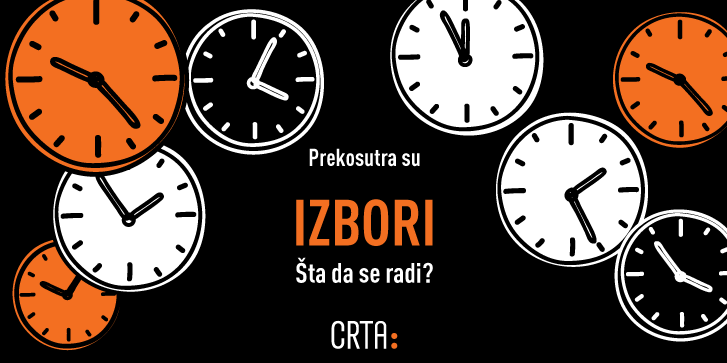Before it’s too late: CRTA presents a proposal for 5 key changes for fair and free elections
 Prekosutra su izbori, šta da se rad?
Prekosutra su izbori, šta da se rad?
As we mark the 30th anniversary of the first multiparty elections in Serbia, with less than a year and a half to go until the regular presidential and Belgrade elections, as well as the announced early parliamentary elections, CRTA is presenting a proposal for five key changes necessary for elections in Serbia to become substantially, and not just formally, democratic.
After the 2020 parliamentary elections, democracy in Serbia has reached its deepest institutional crisis in the last two decades.
“So far, the Government has selectively adopted recommendations that were insufficient to solve essential problems of the electoral process. CRTA believes that key changes need to occur in greater equality of participants, a more balanced media representation, ensuring freedom of choice, protecting voter rights, and a professional electoral administration that would preserve the integrity of the electoral process. Once again, CRTA proposes specific measures which would lead to free and fair elections”, said Rasa Nedeljkov, head of the CRTA Election Observation Mission.
In order for elections to be free, participants need to have approximately similar starting points in the electoral campaign, and in order to achieve that, it is necessary to ensure equality of participants in the candidacy process, prevent the abuse of campaign financing, and the abuse of public resources.
Another necessary condition for free elections is equal media representation because the voters need to have the freedom, as well as the possibility to form their opinion about the candidates. It is necessary to ensure media representation without discrimination in electronic media (public service media and commercial television with national coverage) in all segments, not just the pre-election program. Furthermore, it is necessary to ensure the possibility of equal advertising, to clearly define REM’s (Regulatory Authority of Electronic Media) obligations, and to introduce clear mechanisms for electing and reviewing the responsibilities of the REM Council.
In order for elections to be free, it is necessary to prevent pressure on voters and ensure their freedom of choice by first preventing pressure on employees in public companies and public administration, but also ensure a more active role of public prosecutors in the electoral process. Additionally, it is necessary to ensure equal suffrage for all voter categories, and verify the Voters’ Register.
Free elections imply that the right to vote cannot just be proclaimed, but must be protected in practice, and it is therefore necessary to determine legal deadlines that would enable effective protection of electoral rights, and to expand the powers of the electoral administration in protecting these rights.
Holding free and fair elections must be guaranteed by an independent and professional authority for organizing elections. It is therefore necessary to first reform the entire electoral administration system at all levels, which includes the systematization of all electoral laws in a single electoral code (right now, there are seven laws that apply to the electoral process), and harmonizing the deadlines for electoral actions. It is also necessary to enhance the transparency of the election administration, and raise the capacities of the polling station committees.
As a reminder, during the 2020 elections, voters were deprived of equal and objective information about the electoral offer because there was almost no pluralism in the media; numerous instances of abuse of public resources and public office for campaigning were recorded, thus the inequality of candidates as well; clientelism, pressures and intimidation, seen in previous elections as well, further diminished the freedom of choice; the integrity of the electoral process was threatened, and the election day was on the verge of regularity.
The entire first version of the document with recommendations you can find here.








